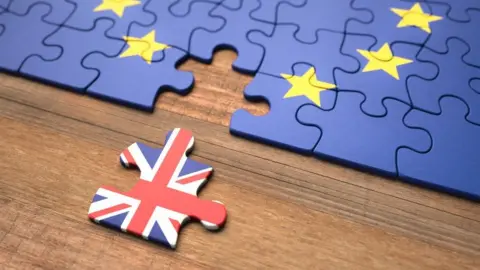Brexit: EU and UK 'still at odds' over subsidy rules
 Getty/ktsimage
Getty/ktsimageThere appears to be "persistent and fundamental" differences between the UK and EU over a significant part of the NI Brexit deal, MPs have concluded.
The European Scrutiny Committee has been examining the operation of the Northern Ireland Protocol.
It said the EU and UK are still at odds over the extent to which EU subsidy rules still apply to UK businesses.
It added that this lack of clarity may impact on the willingness of companies to accept UK government subsidies.
The MPs focused on Article 10 of the protocol which deals with "state aid", or government subsidies.
The terms of the NI Protocol, it means Northern Ireland is still in the EU single market for goods and remains subject to EU subsidy rules for trade in goods.
However, Article 10 also says the UK as a whole should follow EU rules if a UK-wide subsidy could have an impact on trade in goods between Northern Ireland and the European Union.
For example, if a UK-wide subsidy was to give NI firms an unfair advantage over other companies in the EU single market.
Just months after agreeing the protocol, the UK government became concerned Article 10 could leave significant parts of the UK economy under EU subsidy rules.
The UK and EU reached further agreement on this issue in December with the EU stating that it would only apply if a UK subsidy would have "real and foreseeable" impact on NI-EU trade.
The government said that had addressed its concerns about the scope of Article 10, but the MPs cast doubt on this.
They said that further guidance given by the two sides since then is directly contradictory.
'Worrying'
Essentially, the UK government believes there is a very high bar for UK-wide subsidies to be covered by Article 10 while the EU sets the bar much lower.
The MPs concluded: "The continued application of EU state aid rules under the protocol on Northern Ireland was always likely to be controversial.
"However, it is worrying that the extent to which such rules will continue to be binding on the UK under Article 10 of the protocol are still interpreted very differently by the government and the European Commission."
They said the boundaries of Article 10 are likely to only become clearer through practice and, most likely, legal challenges.
They are concerned that until there is clarity some companies may be reluctant to take UK subsides for fear they could be later found to breach EU rules and have to be paid back.
A UK government spokesperson said it remains "committed to working constructively and transparently with parliament on issues related to the Withdrawal Agreement Joint Committee (WAJC), including on appropriate arrangements as the Withdrawal Agreement structures develop following the end of the transition period".
They add this will "build on existing arrangements" where written ministerial statements are provided before and after joint committee meetings, government engagements with select committees, and facilitating ongoing scrutiny of measures applying in Northern Ireland because of the protocol.
